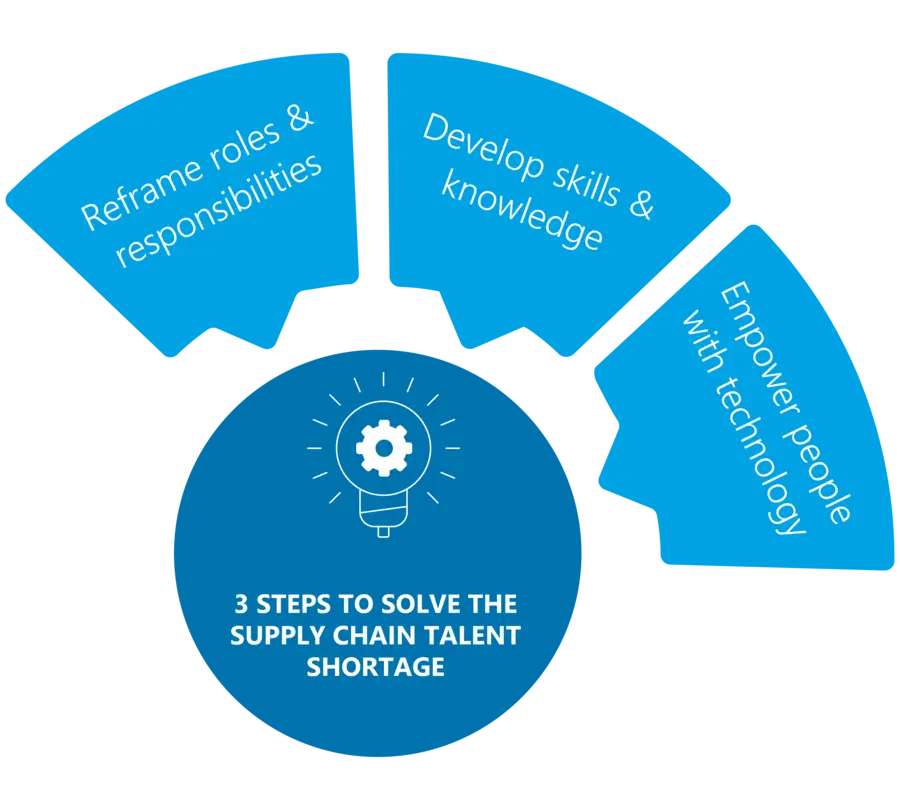Table of contents
Table of contents- Time to tackle the supply chain talent crisis
- The supply chain talent crisis ripple effect
- Create a more capable supply chain team
- Reframe roles and responsibilities
- Upskill your existing team
- A customer case study: BMN embraces the Slimstock Academy to empower its people
- Adopt technology to help your best people be better.
- Final thoughts…
- Supply chain skills FAQs
There is an unprecedented skills shortage worldwide, and the situation is not going to get any easier.
In a recent study from Alcott Global, 50% of senior supply chain executives named the talent shortage one of the industry’s most significant issues in the next 12 months. From planning to production, all points of the end-to-end supply chain face a similar challenge – there is not enough talent to go around.
These gaps range from more manual areas, such as warehouse order picking, to building and maintaining supply-chain systems. In fact, according to a report from DC Velocity, businesses face skills gaps across all levels of seniority with severe shortages of digital and data experts. 58% reported a need for more talent in data analytics, optimization, and automation.
The supply chain talent crisis ripple effect
Recruiting and keeping qualified workers is the leading challenge for the 2,000 supply chain executives responding to a recent survey by MHI, a supply-chain industry trade association.
A majority, 57% in fact, state hiring and retaining qualified workers is this year’s greatest challenge, along with 56% struggling with ongoing specific talent shortages.
But the ongoing talent challenge also has a broader compounding impact on your business. Due to the rising cost of labour (a consequence of demand far outstripping supply), the costs of manufacturing goods, distributing inventory and providing services are also rising.
Your margins might be squeezed, so you can no longer compete in today’s hyper-competitive global market. If things were stretched already for you as a business, they won’t get any easier.
Create a more capable supply chain team
The reality of the current situation is harsh. There’s an ongoing war for talent. And like most wars, it’s not a fair fight. Those with the biggest budgets and best hiring processes will always have the upper hand.
But that does not mean all hope is lost. You can forge a more capable and efficient supply chain team by embracing innovation and empowering your people.
The point here is simple: the current talent shortage is painful for many businesses. However, those who successfully navigate the talent crisis will be rewarded with a competitive edge over their industry rivals.
Therefore, we should view the supply chain talent shortage not as a problem but as a massive opportunity for growth. Hence, in this article, we will explore how to strengthen your team to new heights by:
- Reframing roles and responsibilities to future-proof your supply chain team.
- Developing the supply chain skills & knowledge required to succeed.
- Empowering your people with the right technologies
Reframe roles and responsibilities
The role of the supply chain team has transformed in recent times. Many companies no longer see the supply chain team as mere operational executors. Today, supply chain professionals adopt a more tactical and strategic position than ever before.
Traditional supply chain roles are being redefined, and the responsibilities are also shifting. You need people who understand the impact of supply chain decisions on the wider business and who can bring departments together to ensure fully joined-up planning. Most importantly, your supply chain people must drive accountability and ownership.
Upskill your existing team
Your people play a pivotal role in realising your business goals. This is a fact that is especially true for those in your supply chain team. And in these times where good talent is in short supply, it makes sense to help develop the skills they need to succeed.
Perhaps that is why there has been a 15% increase in companies investing in training programs, with 41% looking at ways to prepare their workforce for “tech-forward” supply chain roles.
However, learning and development in a business setting can be a challenging goal to implement. You’ll get pushback from those who don’t believe they have the time alongside their day jobs and those who assume they don’t need it. But if you can establish an effective learning culture, it’s for everyone’s benefit.
A customer case study: BMN embraces the Slimstock Academy to empower its people
As part of its mission to optimise its end-to-end supply chain, BMN, a leading construction wholesaler, has embraced Slimstock’s Academy. By providing its planning team with knowledge, skills, and supply chain best practices, the business has unlocked impressive performance improvements:
- Increased supply chain agility
- Enhanced efficiency and productivity of the planning team
- Increased user confidence resulting in better utilisation of supply chain technologies
Developing skills with the 70-20-10 model
The 70-20-10 model is an excellent way of delivering on your talent development goals. The premise is simple:
- 70% of development should happen on the job.
- 20% of development happens through relationship-based learning, whether that’s mentorship programs or knowledge sharing with colleagues
- 10% is delivered via formal training.
Upskilling your team is one thing but helping them to develop the ‘right’ skills is quite another. The focus here should be on the so-called hard and soft skills.
Hard Skills
What are hard skills- Anything that constitutes someone’s ability to do their job well.
That means technical prowess, the use of technology, strategy, supply chain optimisation and a whole host of ‘ground level’ skills that constitute the difference between satisfactory and awe-inspiring.
The hard skills of an employee will differ per department, role, and seniority. Could someone in your Finance department make a supply chain team player? Absolutely. But there’ll be a lead time to get that person up to scratch and instil the hard skills they need.
Soft Skills
Soft skills can also be considered people skills. As your supply chain team becomes increasingly prominent within your organisation, it is vital that your supply chain people effectively engage with others.
Communication is a great example. It is a skill that differs depending on who the communication is with. CEOs communicate differently than middle management and middle management doesn’t communicate in the same way as your warehouse staff will.
Collaboration also counts as a soft skill. As does teamwork, problem-solving, critical thinking, negotiation, emotional intelligence, leadership, and time management. If you haven’t got a method for training and developing soft skills in your supply chain team, you’re missing out on a massive area for improvement.
Adopt technology to help your best people be better.
Businesses are embracing advanced supply chain technologies at an accelerating rate. A recent survey from MHI highlighted that 74% of supply chain executives are increasing their investment in technology.
But keep sight of the strategy behind that investment. Real success comes from utilising technology to remove the shackles from your best performers. After all, technology should empower your people, not replace them.
Final thoughts…
There is a catch to all this. To leverage technology to plug gaps in your teams, you need the skills to successfully implement the technology in the first place.
However, your supply chain team must embrace new technologies and development opportunities with an open mind.
To tackle the talent shortage, redefining supply chain responsibilities, upskilling and adopting new technology all go hand in hand. Only then can the supply chain community overcome the talent shortage.
Supply chain skills FAQs
What are supply chain skills?
Supply chain skills encompass a broad range of technical capabilities, including supply chain management, inventory control, demand forecasting, supplier relationship management, and ‘soft’ people skills such as critical thinking and emotional intelligence.
Is there a shortage of supply chain talent?
There is currently a shortage of supply chain talent, particularly in specialized areas such as data analytics and supply chain technology.
Is supply chain a promising career path?
Supply chain presents a promising career path due to its integral role in ensuring operational efficiency, cost-effectiveness, and customer satisfaction within organizations.
How does the supply chain talent shortage impact the wider business?
The impact of the supply chain talent shortage can result in increased operational costs, inefficiencies in delivery and production processes, reduced customer satisfaction, and missed growth opportunities.








